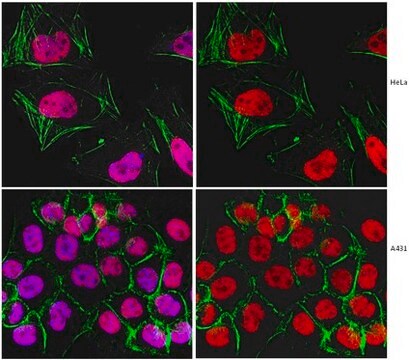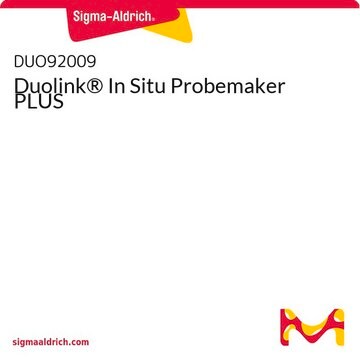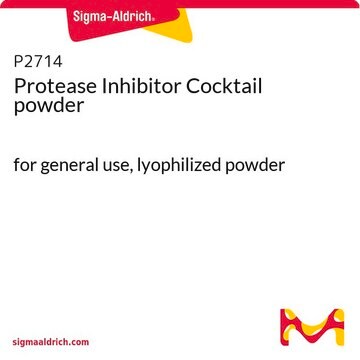NA19L
Anti-Replication Protein A (Ab-3) Mouse mAb (RPA34-20)
Sinónimos:
Anti-RP-A
Iniciar sesiónpara Ver la Fijación de precios por contrato y de la organización
About This Item
Productos recomendados
antibody form
purified antibody
Quality Level
clone
RPA34-20, monoclonal
form
lyophilized
species reactivity
yeast, human, mouse
isotype
IgG2a
General description
Purified mouse monoclonal antibody generated by immunizing BALB/c mice with the specified immunogen and fusing splenocytes with NS1 mouse myeloma cells. Recognizes the complexed (phosphorylated) and the ~34 kDa unphosphorylated subunit of replication protein A.
Recognizes the complexed (phosphorylated) and unphosphorylated subunits of replication protein A in HeLa and U293 cells and colon carcinoma tissue.
The replication system of a cell contains several essential components among which are replication factor A (RFA, RPA, or HeLa cell SSB), PCNA, and replication factor C (RFC) as well as several other proteins. RPA, a multi-subunit protein containing a 70 kDa, 34 kDa, and 11 kDa protein, may play a critical regulatory role in replication based on its functioning during both the initiation and elongation stages of DNA replication. The protein is highly conserved, having been identified in a range of species from yeast (Saccharomyces cerevisiae) to humans. The primary function of RPA appears to be as an auxiliary protein for both DNA polymerase α and δ. RPA undergoes a cell cycle dependent phosphorylation, which is restricted to the p34 protein. In addition to existing as part of the multi-subunit structure, p34 has also been identified as being present in a free, unphosphorylated form. Recent data shows that RPA is restricted to the nucleus and is overexpressed in transformed cells as well as in several tumor cells.
Immunogen
Epitope: within the p34 subunit of replication protein A
Human
replication protein A purified from U293 cells
Application
Immunoblotting (5 μg/ml)
Immunofluorescence (2.5 μg/ml)
Immunoprecipitation (1 μg/reaction)
Paraffin Sections (2.5 μg/ml, heat pre-treatment required)
Immunofluorescence (2.5 μg/ml)
Immunoprecipitation (1 μg/reaction)
Paraffin Sections (2.5 μg/ml, heat pre-treatment required)
Physical form
Lyophilized from 20 mM ammonium bicarbonate solution, 100 μg BSA.
Reconstitution
We recommend resuspending the lyophilized antibody with sterile phosphate buffered saline (PBS), pH 7.4, or sterile 20 mM Tris-saline (20 mM Tris containing 0.15 M NaCl), pH 7.4, to yield a final concentration of 100 μg/ml; product will be more stable
Analysis Note
Positive Control
HeLa or U293 cells or colon carcinoma tissue
HeLa or U293 cells or colon carcinoma tissue
Other Notes
Replication protein A (Ab-3) will react with both the complexed (phosphorylated) form of the protein as well as the free (unphosphorylated) 34 kDa subunit. Replication protein A can be used as a marker for cell division. Antibody should be titrated for op
Storage Class
11 - Combustible Solids
wgk_germany
WGK 1
flash_point_f
Not applicable
flash_point_c
Not applicable
Certificados de análisis (COA)
Busque Certificados de análisis (COA) introduciendo el número de lote del producto. Los números de lote se encuentran en la etiqueta del producto después de las palabras «Lot» o «Batch»
¿Ya tiene este producto?
Encuentre la documentación para los productos que ha comprado recientemente en la Biblioteca de documentos.
S Din et al.
Genes & development, 4(6), 968-977 (1990-06-01)
Replication factor A (RF-A) is a multisubunit, cellular protein that functions with SV40 T antigen during the initiation stage of DNA replication at the SV40 origin. It also cooperates with other replication factors to stimulate the activity of both polymerases
S J Brill et al.
Nature, 342(6245), 92-95 (1989-11-02)
Cell-free replication systems for simian virus 40 (SV40) DNA are taken to be a model for the replication of eukaryotic chromosomes, because only one viral protein is required to supplement the replication proteins provided by a human cell extract. To
Initiation of eukaryotic DNA replication in vitro.
B Stillman
Annual review of cell biology, 5, 197-245 (1989-01-01)
T Tsurimoto et al.
The EMBO journal, 8(12), 3883-3889 (1989-12-01)
DNA synthesis by two eukaryotic DNA polymerases, alpha and delta, was studied using a single-strand M13 DNA template primed at a unique site. In the presence of low amounts of either DNA polymerase alpha or delta, DNA synthesis was limited
C R Wobbe et al.
Proceedings of the National Academy of Sciences of the United States of America, 84(7), 1834-1838 (1987-04-01)
Simian virus 40 (SV40) DNA replication dependent on the SV40 origin of replication and the SV40 large tumor (T) antigen has been reconstituted in vitro with purified protein components isolated from HeLa cells. In addition to SV40 T antigen, these
Nuestro equipo de científicos tiene experiencia en todas las áreas de investigación: Ciencias de la vida, Ciencia de los materiales, Síntesis química, Cromatografía, Analítica y muchas otras.
Póngase en contacto con el Servicio técnico








